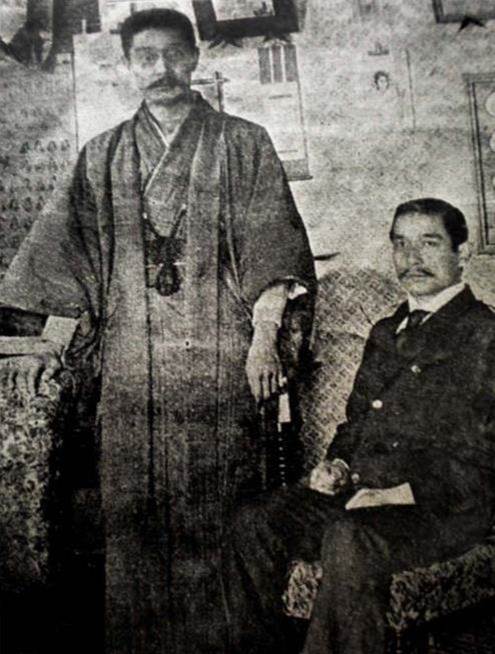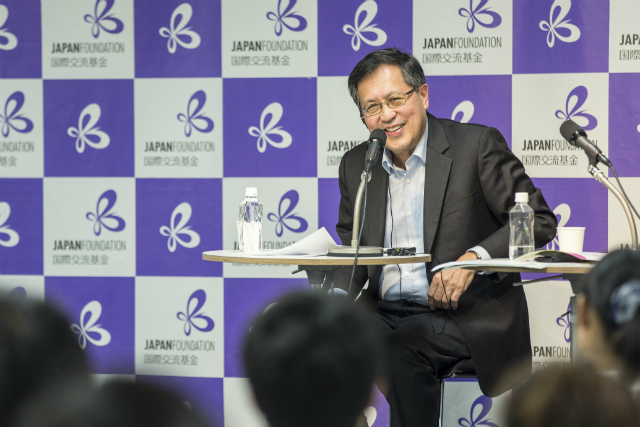The Past in the Present Crisis
Let me bring this discussion to bear on the present by reflecting on a very recent event: then-President Benigno S. Aquino III's address to the Filipino-Chinese community in celebration of Philippine Independence Day on June 8, 2015.
 Aquino began by reflecting on a photograph of Sun Yat Sen and Mariano Ponce taken in Yokohama, Japan. This was projected on a large screen for the audience to reflect on it too. He ended with a positive observation that the Filipino-Chinese relationship would improve with "mutual respect" and "commitment to the rule of law." This conclusion followed what Aquino said about the photograph:
Aquino began by reflecting on a photograph of Sun Yat Sen and Mariano Ponce taken in Yokohama, Japan. This was projected on a large screen for the audience to reflect on it too. He ended with a positive observation that the Filipino-Chinese relationship would improve with "mutual respect" and "commitment to the rule of law." This conclusion followed what Aquino said about the photograph:
The man seated is Sun Yat Sen, honored as the Father of Modern China. Standing beside him is Mariano Ponce: a close personal friend of both Dr. Sun Yat Sen and our national hero, Dr. Jose Rizal, and thus a member of the generation who fought for the establishment of an independent Philippines.
He continued,
In 1898...we Filipinos proclaimed our independence in Kawit, Cavite. In 1911, Sun Yat Sen overthrew the oppressive Qing Dynasty. Both these men were spurred to action by the principles of freedom and equality, and the desire for progress, peace, and stability for their countrymen. These very aspirations brought them together, as friends and as partners who sought to help each other in their respective struggles.*14
*14 "Speech of His Excellency Benigno S. Aquino III President of the Philippines at the FFCCCII and the Filipino-Chinese community's celebration of the 117th Philippine Independence Day," PICC, Pasay City, June 8, 2015. Available at http://www.officialgazette.gov.ph/2015/06/08/speech-of-president-aquino-at-the-ffcccii-and-the-filipino-chinese-communitys-celebration-of-the-117th-philippine-independence-day/
What Aquino highlights in this photograph is the pairing of two earthshaking events: the Philippine Revolution against Spain in 1898 and the Chinese republican forces' Xinhai Revolution against the Qing Dynasty in 1911. The common aspiration for freedom brings together the Filipino Mariano Ponce and the Chinese Sun Yat Sen "as friends and as partners."*15 What better way to establish a shared history between the Philippines and China!
*15 Ibid.
While Aquino acknowledged the year the photograph was taken [1899], he omitted one historical event of that year: the outbreak of the Philippine-American War in February. The first battle of this War, the Battle of Manila, was fought between the armies of Generals Emilio Aguinaldo and Arthur MacArthur (the father of Douglas). Mariano Ponce is in Yokohama to represent the Filipino republic and secure Japanese arms and other support against US invasion. Sun Yat Sen is there for similar reasons: to seek Japan's assistance and to establish ties with the Filipinos. A model for anticolonial struggle, the Filipino resistance against American occupation was, for Sun Yat Sen, synonymous with the revolution he had led to overthrow the Qing Dynasty.
We can now understand why Aquino, in his Independence Day speech, ignored this event: if he revealed the Philippine-American War context of the photograph, he would be undermining the dominant history of the Filipino-American struggle for Kalayaan, the Filipino term for "independence" or "freedom."
This fight for Kalayaan reappears in present-day geopolitics in disputes over territory where, this time, China is constructed as the new enemy. Claiming sovereignty over the Spratly Islands, the Philippines have, in fact, named the shoals in the Spratlys "Kalayaan." The United States are again back in the picture, working together with the Philippines to "liberate" these shoals from China.
As a historian, I see the time of my father strangely repeating itself. "Who defeated Nazi Germany?" for instance. Actually it was the Soviet army that broke the back of Hitler's army, but over the last two decades there has been an attempt to make the younger generation think that it was Americans who liberated Europe from German fascism. This controversy was brought closer to home when, in June 2015, then-President Aquino compared China's behavior in the South China Sea to Nazi Germany's territorial conquests prior to the outbreak of World War II.*16 The Americans, said Aquino, should prevent China from doing what Nazi Germany did in the past. Naturally, the Chinese ambassador to Manila responded that this was a very strange way of doing history, because in fact it is the Japanese that we must warn against repeating past misdeeds.
*16 The Japan Times, "China is Acting Like Nazi Germany, Says Philippines' Aquino," (June 3, 2015). Available at http://www.japantimes.co.jp/news/2015/06/03/national/politics-diplomacy/china-is-acting-like-nazi-germany-says-philippines-aquino/#.WG2zkWe7prk.
The war over sovereignty of the Spratly Islands—the little pieces of rocks in the South China Sea—is causing history to be revised and reinterpreted in ways that shift and re-establish alliances and enemies.
This is one message of my lecture: to warn that history can be twisted. We must be aware of and be careful about how history can be manipulated by parties—political or not—to satisfy their needs, to rewrite history to best suit the narrative they push for. That is precisely why historians must have the courage to stand firm and to remain as true to the facts they possibly can.
Thank you all for your kind attention.

Editors: Meiko Sano, Kei Kojima(The Japan Foundation Asia Center)
Plates: Courtesy of the Author
Photo: Motoi Sato






